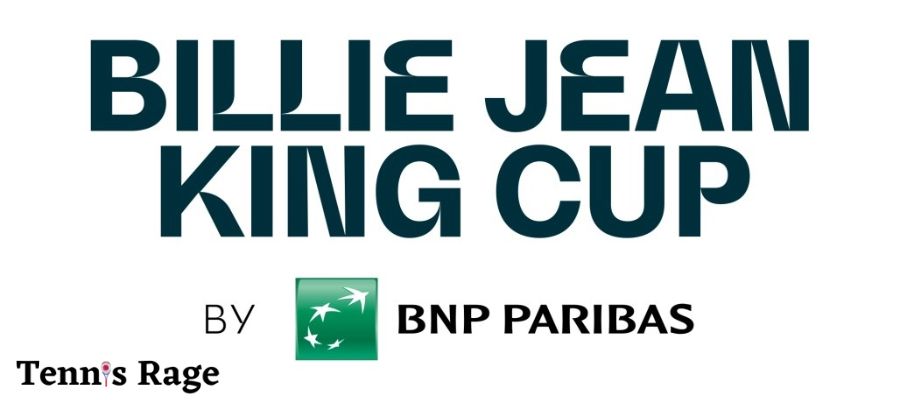Last weekend, the qualifying matches of the Billie Jean King Cup took place. These Qualifying matches determined which 12 teams advance to the Finals which will take place in November 2023.
18 teams participated in the Qualifiers and nine of them advance to the Finals. The way the annual tournament works is that the top two finishers from last year automatically qualify for the Finals.
Since Switzerland and Australia were the top two finalists in 2022, with Switzerland winning the tournament, both countries have already secured their spots in the 2023 Finals.

There is also a wild card spot which normally goes to the host nation but if the host nation has already qualified, it will be awarded to a different country as a wild card entry. This wild card spot has not yet been determined. The remaining 9 spots were determined in last weekend’s qualifying matches. They are:
(1) Spain (who defeated Mexico in the Qualifying match)
(2) Czech Republic (who defeated Ukraine in the Qualifying match)
(3) France (who defeated Great Britain in the Qualifying match)
(4) Canada (who defeated Belgium in the Qualifying match)
(5) United States (who defeated Austria in the Qualifying match)
(6) Italy (who defeated Slovakia in the Qualifying match)
(7) Germany (who defeated Brazil in the Qualifying match
(8) Kazakhstan (who defeated Poland in the Qualifying match), and
(9) Slovenia (who defeated Romania in the Qualifying match)
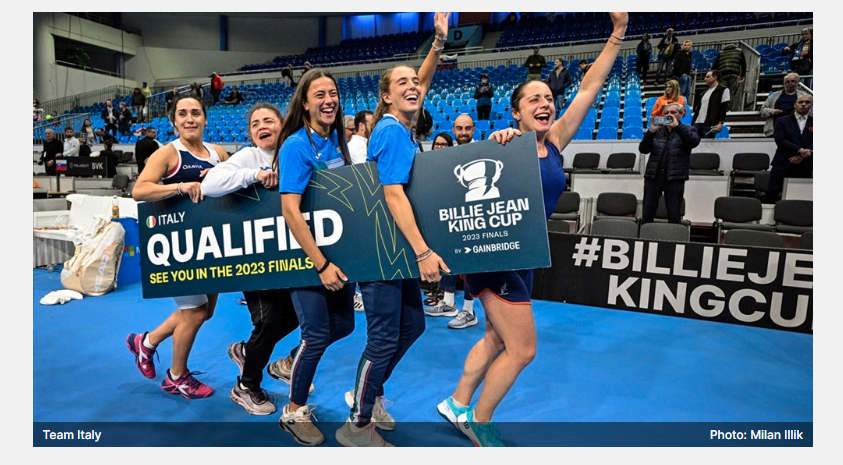
What Is The Billie Jean King Cup?
The Billie Jean King Cup is a six-decade old annual global competition that has been bearing its current name for only a few years. It was founded way back in 1963, under the name of the Federation Cup. The Federation Cup, now called the Billie Jean King Cup, is the women’s equivalent to the David Cup for men.
This competition was founded in honor of the 50th birthday of the International Tennis Federation (ITF). The ITF, which is the world governing body of tennis, runs this tournament, just as it runs the Davis Cup for men.
After a little more than three decades, the competition the tournament shortened its name to the Fed Cup in 1995. The last name change of the competition was in 2020 when it was renamed in honor of Billie Jean King, the former world number one.
Interestingly, she won the first edition of this competition as part of Team USA in 1963. Today, almost 100 national teams compete in this global tournament.
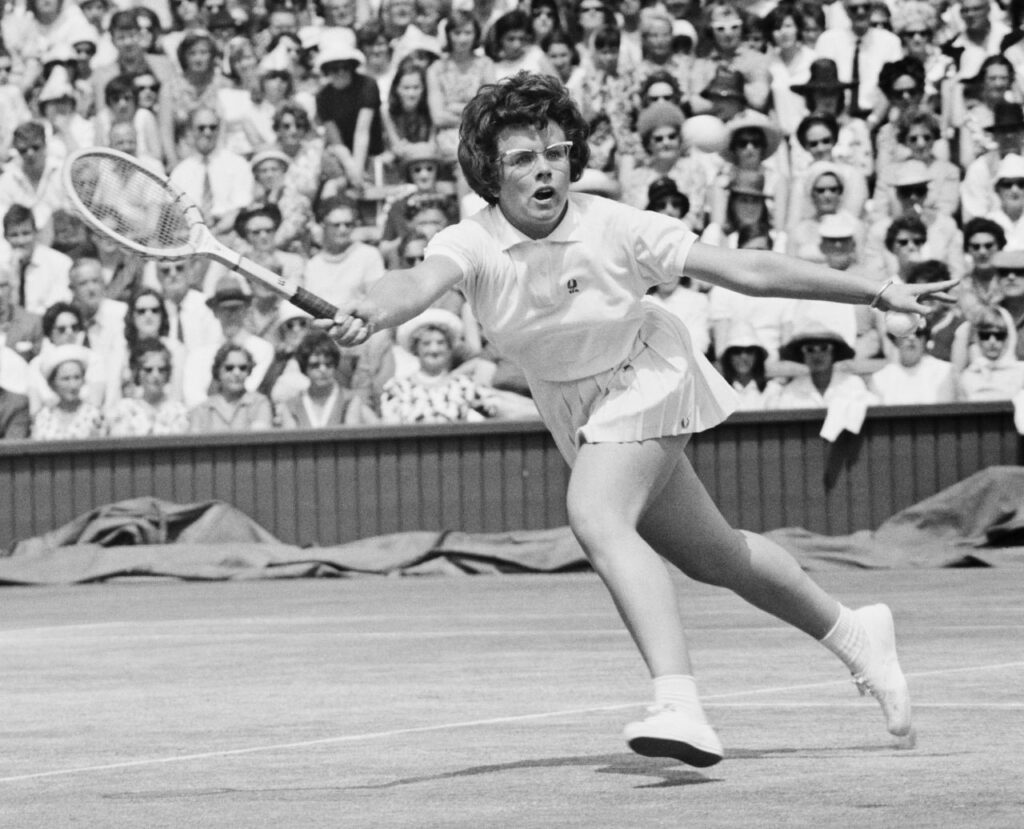
Another former American tennis player, Katrina M. Adams, manages this competition. She was previously chair of the US Open and CEO of the United States Tennis Association. As a professional, Katrina Adams was known as a strong doubles player. In the doubles competition, she won 22 WTA titles, and her playing partners were most often Zina Garrison and Manon Bollegraf.
She appeared in 36 WTA doubles finals in her career, losing 14 of them. As a singles player, she reached the finals of WTA tournaments twice and was defeated both times.
Her best world ranking in doubles was eighth place. on the WTA list, and after a very solid career as a player, she stayed in tennis and devoted herself to managing several prestigious tournaments, including the Billie Jean King Cup.
Today, almost a hundred teams participate in this prestigious competition.
Billie Jean King- Great Player And Fighter For Human Rights
Since 2020, the competition has been named after Billie Jean King, who won an extraordinary 129 titles in singles during her career and 20 doubles victories. She won 12 Grand Slams in singles and 18 in doubles. She even won 11 mixed doubles Grand Slam titles. She is also one of the few players who has been ranked number one in the world list in both singles and doubles during her career.
She achieved her greatest success at the world’s most prestigious tournament, Wimbledon, which she won six times in singles and 14 times in doubles, including mixed doubles.
She also won the Federation Cup seven times with the United States, including the first edition of this competition. She was her team’s Federation Cup captain 4 times.
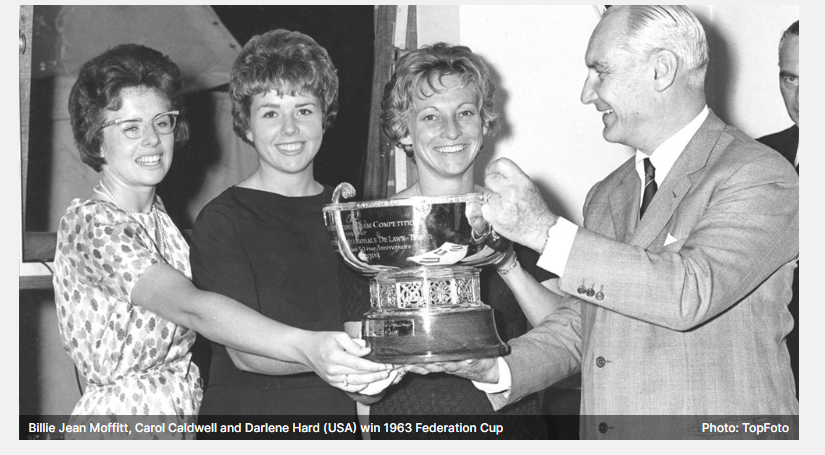
Billie Jean King is also the founder of the Women’s Tennis Association (WTA), which was created in 1973. As one of the most successful players in the history of tennis, both on and off the court, she was inducted into the International Tennis Hall of Fame in 1987.
In addition to her great tennis career, Billie Jean King is also known as a great fighter for human rights and gender equality, including fighting to ensure that women receive equal prize money as their male counterparts.
In 1973, Billie Jean King battled Bobby Riggs in a famous match known as the Battle os the Sexes. Bobby Riggs, a former number one player in the world but who was then 55 years old, claimed that he could beat the top ranked women in the world.
Billie Jean King, who was 29 years old at the time, accepted the challenge, which took place in Houston on September 20, 1973. The match was watched by a massive audience and captured the attention of the entire world. Billie Jean King emerged victorious, winning 6-4, 6-3, 6-3.
History of the Billie Jean King Cup
Although the competition itself was founded in the 1963, the idea of creating a women’s team competition was born several decades earlier. The original idea came from Hazel Hotchkiss Wightman who was dominant in women’s tennis in the early 1900s. A competition named after her was created and was called the Wightman Cup.
Only Great Britain and the United States participated in this annual competition. The original idea Wightman had of an international tournament open to all countries became a reality four decades later when the Federation Cup was created.
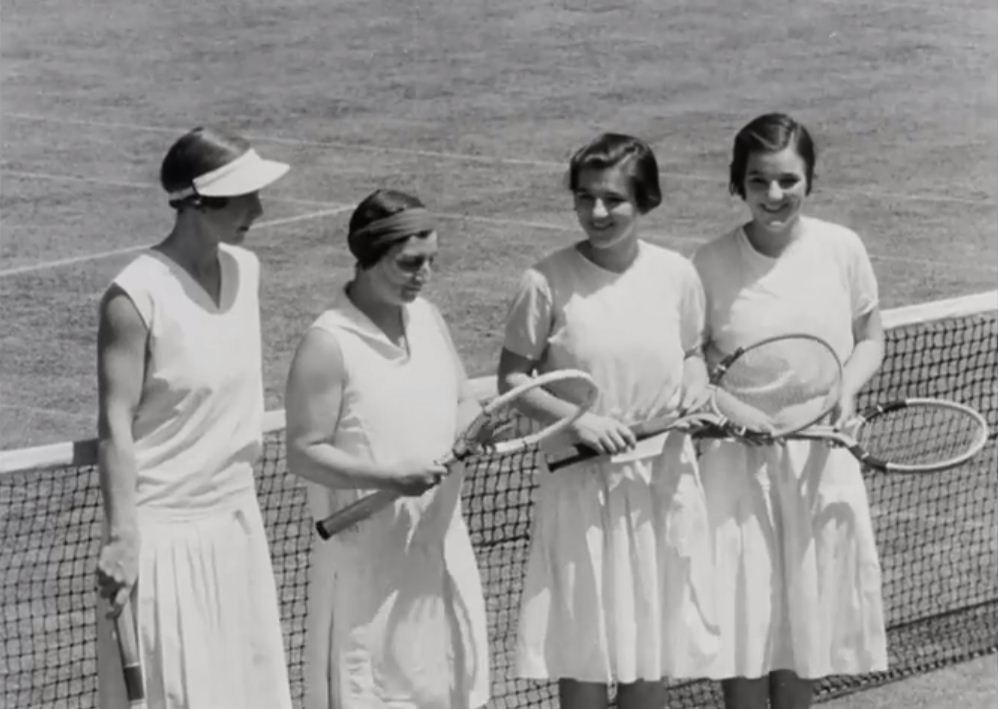
In the Federation Cup’s first final, which took place in 1963, the United States defeated Australia in the finals. In the beginning, this competition was not very popular and did not offer any monetary prize, but over time sponsors entered this competition and an increasing number of national teams got the opportunity to compete.
Last year, the winning team received $2,000,000 in prize money, with an aggregate total of $8,000,000 awarded to all teams.
The United States has the most titles in the history of the Billie Jean King Cup, winning the Cup 18 times. However, the United States has only won the Cup once in the last 20 years. Right behind the United States in terms of success in this competition is the Czech Republic, which has won 11 titles, including 6 of the last 11 tournaments.
The United States and the Czech Republic are the only countries with a double-digit number of titles. In the history of this competition, 12 different national teams have emerged victorious.
Format of the Billie Jean King Cup
As mentioned above, 12 teams compete in the Finals. 9 of the 12 teams must qualify. The top two teams from the previous year’s tournament receive automatic entry in the Finals, and one wild card spot is awarded.
For teams that do not make it to the Finals, there are play-offs, which will take place in November. The winning teams in the play-offs earn the right to compete in next year’s Qualifiers. The losing teams compete in what is known as Group I events the following year. Group I events are divided into three regions, Americas, Asia/Oceania and Europe/Africa.
In addition to Group I, there are also Group II and Group III competitions for less competitive teams.
The entire rules and regulations of the tournament can be found here.
Billie Jean King Cup 2023 Finals
The qualifying round matches for this year’s Finals were played last week. Of the nine seeded teams, seven national teams managed to secure a spot in the Finals, with only Slovakia and Romania failing to advance to the final round, as they were defeated by Italy and Slovenia in close matches.
In addition to these two national teams, the finalists from last year, Switzerland and Australia, as well as Spain, the Czech Republic, France, Canada, United States, Germany and Kazakhstan, will fight for the trophy from November 7 to 12 later this year. Switzerland is defending its title after winning the Cup in Glasgow last year.
Plus, the winning team also receives a cash prize. The 2022 cash prize for the winning team was $2 million dollar.
Other participating teams also received smaller amounts and the tennis federations of participating countries also received funds.

